Chegg Bundle
Can Chegg Navigate the AI-Driven Education Revolution?
Chegg, a prominent player in the online education sector, offers a wide array of student resources, from textbook rentals to online tutoring. Despite a challenging market, with a 14% year-over-year decrease in revenue in 2024 and a 30% decrease in Q1 2025, the company continues to adapt. Understanding Chegg SWOT Analysis is key to grasping its strategic positioning in the evolving landscape of online education.
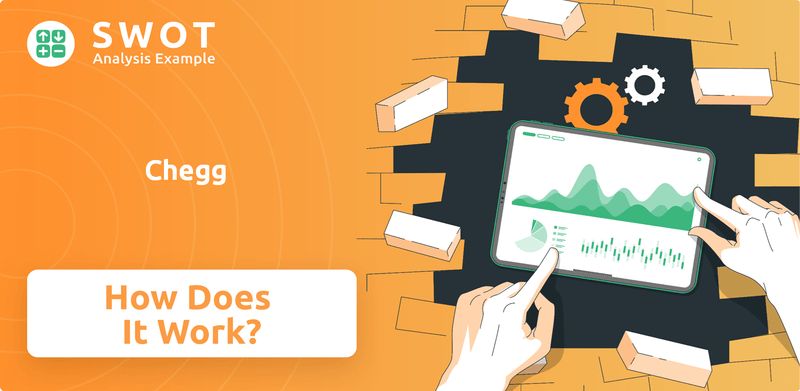
This exploration into How Chegg works will delve into its operational model, revenue streams, and the strategic initiatives it's undertaking to combat increased competition. We'll examine the Chegg platform's features, including study help, and assess its potential for future growth amidst the rise of AI and changing student needs. Analyzing Chegg's performance provides valuable insights for anyone interested in the future of online education and the evolving dynamics of the student market.
What Are the Key Operations Driving Chegg’s Success?
The core operations of Chegg revolve around providing digital learning services primarily to high school and college students globally. The company's value proposition lies in offering a comprehensive suite of tools and resources designed to support students throughout their academic journey. Chegg's platform integrates technology, a vast content library, and subject matter experts to deliver educational assistance.
Chegg's services include Chegg Study, which provides step-by-step textbook solutions and expert Q&A, and Chegg Tutors, offering one-on-one online tutoring. The company also offers tools for writing and citation, and career exploration services. By focusing on a holistic approach, Chegg aims to address gaps in the student experience beyond traditional online educational support, offering affordable access to a wide array of resources.
Chegg's strategic focus includes integrating AI to enhance the personalized learning experience. New AI-powered tools like 'Create' and 'Solution Scout' are designed to generate personalized practice materials and compare language models. The company is also actively diversifying its distribution channels, including direct partnerships with educational institutions. Chegg aims to reach 40 pilot programs by the end of 2025.
Chegg Study is a key component of Chegg's offerings, providing textbook solutions and expert Q&A. This service is designed to offer immediate assistance with homework and study materials. Chegg also provides a range of other student resources.
Chegg is actively integrating AI into its platform to enhance the learning experience. Tools like 'Create' and 'Solution Scout' are examples of how Chegg is using AI to personalize and improve study methods. The company continues to innovate in the online education space.
Chegg has formed strategic partnerships to expand its value proposition, such as the collaboration with Max. The company is also diversifying its distribution channels. Chegg aims to reach a wider audience through these partnerships.
Chegg aims to provide holistic support, blending academic and functional resources. This includes organizational proficiency, early career learning, and financial literacy. The goal is to address gaps in the student experience.
Chegg operates by offering a subscription-based model that provides access to a variety of learning tools. The platform uses a vast content library and AI to deliver personalized learning experiences. Chegg provides a range of services to support students.
- Chegg Study offers step-by-step solutions and expert Q&A.
- Chegg Tutors connects students with online tutors.
- The platform integrates AI for personalized learning.
- Chegg offers writing and career exploration tools.
Chegg SWOT Analysis
- Complete SWOT Breakdown
- Fully Customizable
- Editable in Excel & Word
- Professional Formatting
- Investor-Ready Format
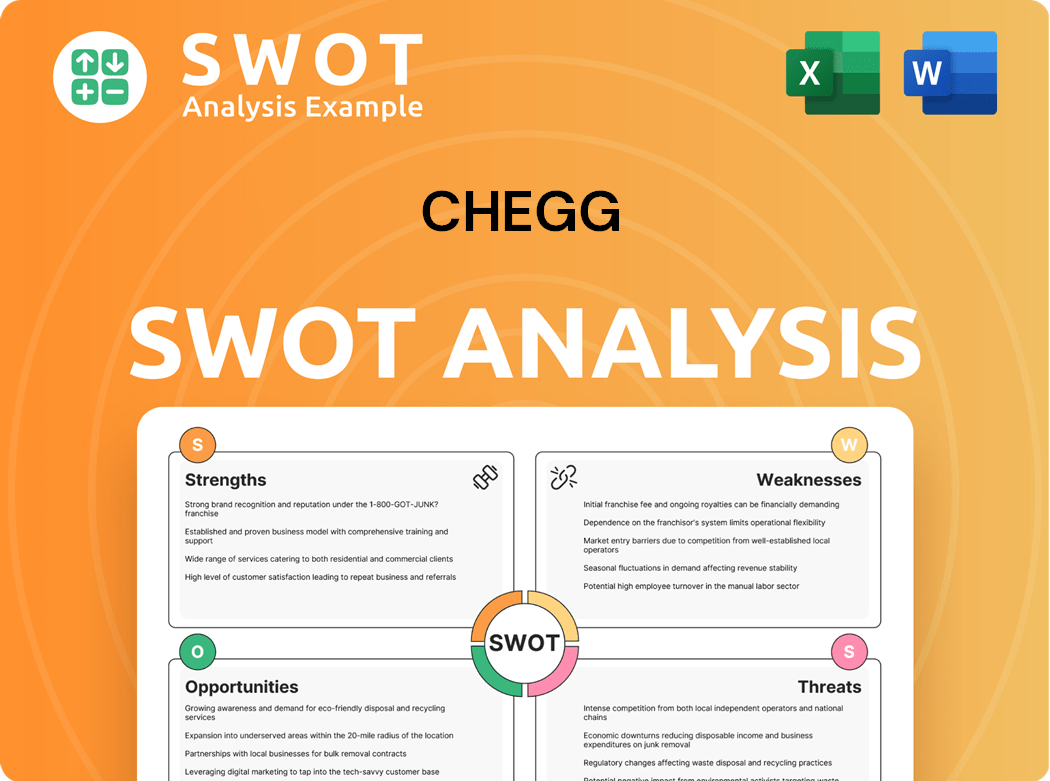
How Does Chegg Make Money?
The [Company Name] generates revenue through a multi-faceted approach, primarily focusing on subscription services and expanding into new areas like content licensing and institutional partnerships. This strategic diversification aims to strengthen its financial position and adapt to the evolving needs of its user base. Understanding these revenue streams is crucial for assessing the company's overall financial health and future growth potential.
The company's ability to monetize its extensive database and adapt to market demands is key to its long-term success. With a focus on both direct-to-student services and institutional collaborations, the company is positioning itself to capture a larger share of the online education market. As the educational landscape continues to evolve, the company's revenue strategies will likely adapt to remain competitive and relevant.
The primary revenue stream for [Company Name] is its Subscription Services, which include offerings like Chegg Study Pack, Chegg Study, Chegg Writing, Chegg Math, and Busuu. In Q1 2025, Subscription Services generated $107.6 million, representing a 30% year-over-year decrease. In 2024, Subscription Services accounted for $549.2 million of the total net revenues, declining by 14% year-over-year. This segment's performance is a key indicator of the company's ability to retain and attract subscribers.
The 'Skills and Other' segment is another significant revenue source, encompassing Chegg Skills, advertising services, content licensing, print textbooks, and eTextbooks. In Q1 2025, this segment generated $14 million. Notably, the company has introduced a new revenue stream through content licensing. This involves leveraging its extensive database of 400 million question-answer pairs, with two deals executed with major technology companies, generating $4 million in Q1 2025 and an expected $7 million in Q2 2025.
- The company is also expanding its business-to-institution (B2I) efforts, which involve direct contracts with educational institutions.
- This initiative grew from 5 pilot programs to 15 in Q1 2025, with a target of reaching 40 by the end of the year.
- Busuu, the language learning unit, showed a 7% year-over-year growth in Q1 2025, with its B2B revenue increasing by 29% year-over-year.
- Busuu is projected to generate approximately $48 million in revenue in 2025.
Chegg PESTLE Analysis
- Covers All 6 PESTLE Categories
- No Research Needed – Save Hours of Work
- Built by Experts, Trusted by Consultants
- Instant Download, Ready to Use
- 100% Editable, Fully Customizable
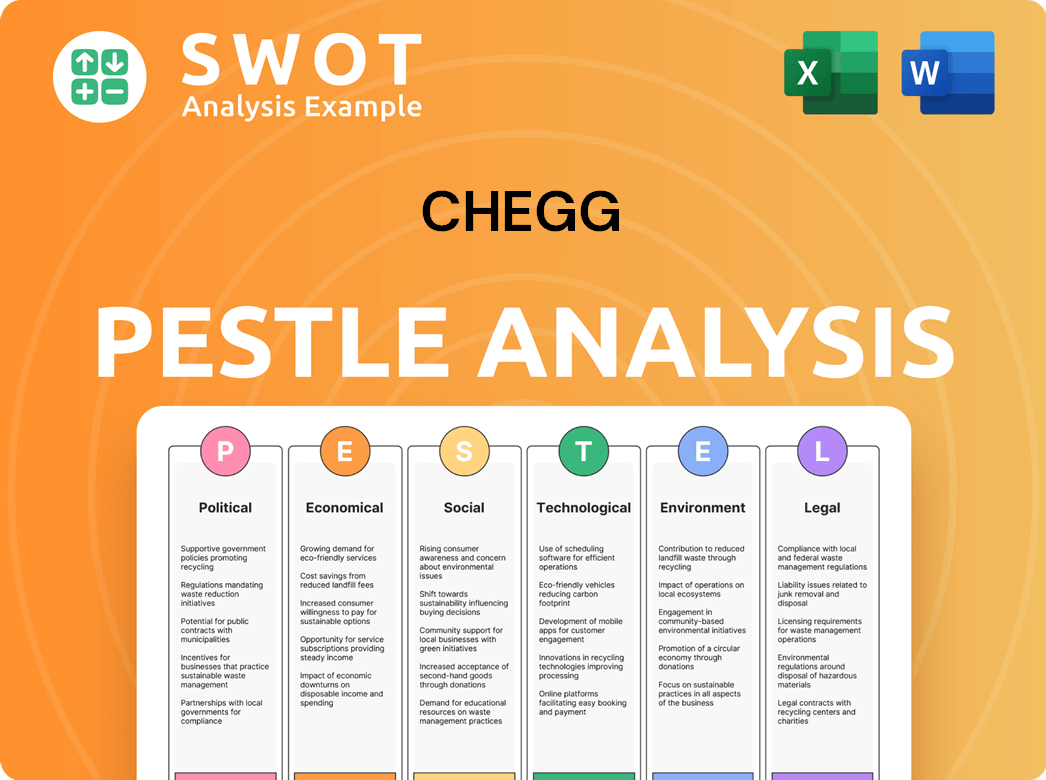
Which Strategic Decisions Have Shaped Chegg’s Business Model?
The evolution of Chegg has been marked by significant milestones and strategic shifts, especially in response to the changing landscape of online education and the rise of AI. The company has navigated challenges through restructuring and innovation. It is currently focused on adapting its business model to maintain its competitive edge in the student resources market.
Strategic moves have been crucial for Chegg, including exploring options to maximize shareholder value and integrating AI into its platform. These actions reflect the company's efforts to adapt to market changes and leverage new technologies. The appointment of Nathan Schultz as CEO in April 2024 highlights the focus on AI integration and innovation.
Chegg's competitive edge has historically come from its brand recognition, diverse offerings, and extensive content library. However, the emergence of free AI tools has impacted its traditional subscription model. The company is responding by integrating AI into its platform and diversifying its distribution channels to maintain its position in the online education market.
In 2024, Chegg implemented two strategic restructuring plans in June and November, which included workforce reductions and office closures. These plans were designed to align expenses with revenue trends. An additional restructuring was announced in Q1 2025, impacting approximately 22% of its workforce.
Chegg initiated a strategic review process in early 2025 to explore alternatives to maximize shareholder value, including potential acquisition or going private. The company also filed a complaint against Google LLC and Alphabet Inc. The appointment of Nathan Schultz as CEO in April 2024 was a key move to lead AI integration efforts.
Chegg's competitive advantages have historically included brand recognition, diverse offerings, and an extensive content library. To counter the impact of free AI tools, Chegg is integrating AI into its platform. The company is also monetizing its database and diversifying its distribution channels by partnering with educational institutions.
The 2024 restructurings resulted in $24.6 million in charges. The Q1 2025 restructuring is expected to generate $45-$55 million in non-GAAP savings in 2025 and $100-$110 million in 2026. Subscriber numbers declined to 3.2 million in Q1 2025, a 31% year-over-year decrease.
Chegg faces significant challenges in maintaining its market position, particularly due to the rise of AI and free online resources. The company is responding with strategic restructuring and innovation to adapt to the changing market dynamics. The company's ability to integrate AI and diversify its offerings will be crucial for its future success.
- Restructuring Efforts: Chegg has undertaken multiple restructuring plans, including workforce reductions and office closures, to align expenses with revenue.
- AI Integration: The company is actively integrating AI into its platform to offer personalized study experiences.
- Strategic Review: Chegg is exploring strategic alternatives, including potential acquisition or going private, to maximize shareholder value.
- Market Impact: The emergence of free AI tools has significantly impacted Chegg's subscription model, leading to a decline in subscriber numbers. For more details, check out the Brief History of Chegg.
Chegg Business Model Canvas
- Complete 9-Block Business Model Canvas
- Effortlessly Communicate Your Business Strategy
- Investor-Ready BMC Format
- 100% Editable and Customizable
- Clear and Structured Layout
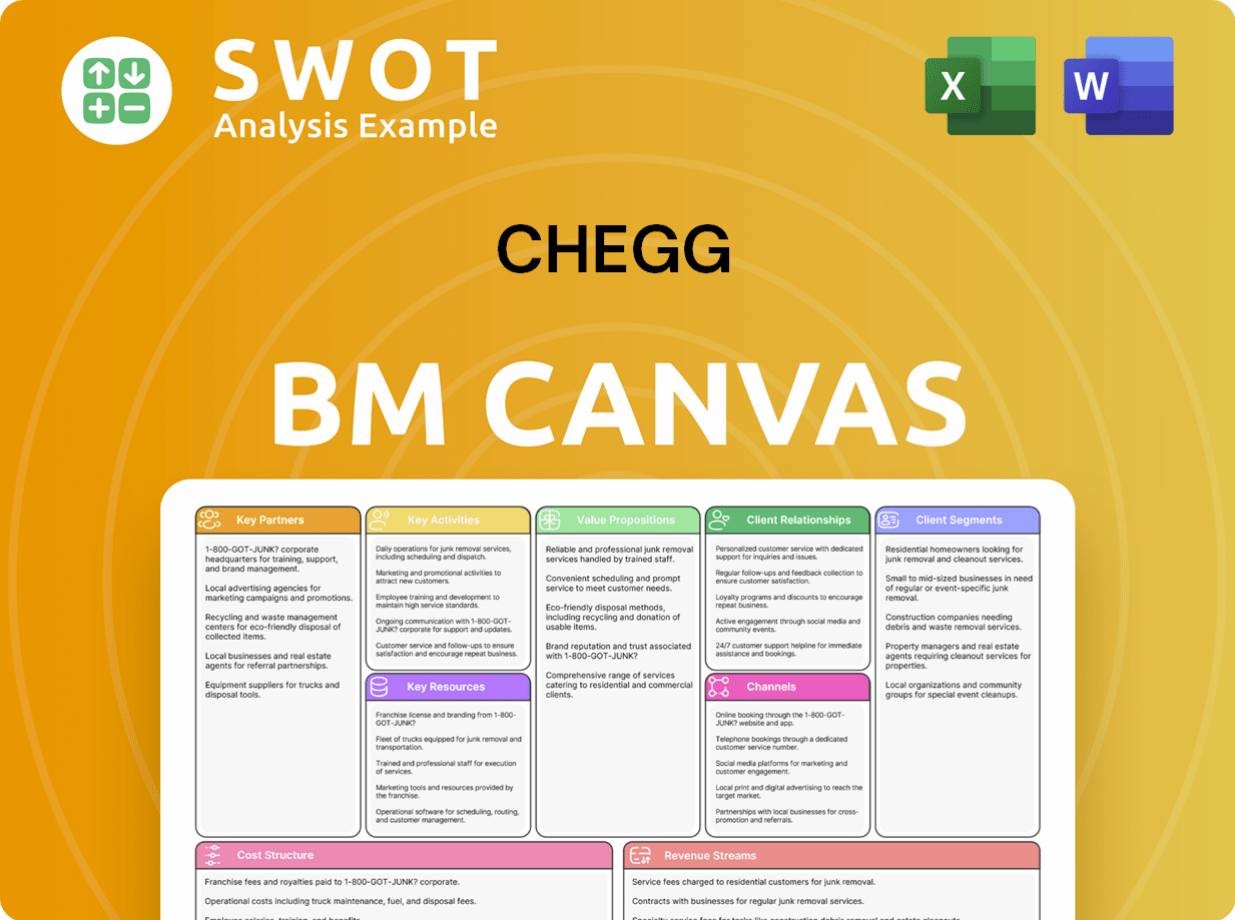
How Is Chegg Positioning Itself for Continued Success?
The company operates within the competitive EdTech sector, contending with both established players and the rapid advancements in AI-driven learning tools. Its market position is currently challenged, as evidenced by declining student traffic and subscriber numbers. For instance, Subscription Services subscribers decreased by 31% year-over-year to 3.2 million in Q1 2025. The company is working to stabilize its business, but revenue is projected to decline by 19.3% annually over the next three years.
Key risks and headwinds for the company include the impact of generative AI services such as ChatGPT and Google's AI Overviews, which provide free or low-cost alternatives to its paid services, directly affecting its subscription revenue model. Regulatory changes in education and data privacy, along with potential litigation related to its business practices, also pose challenges. Economic downturns and market saturation in the EdTech space further contribute to revenue pressures. Learn more about the Growth Strategy of Chegg.
The company faces stiff competition from traditional educational institutions and the rising influence of AI. Declining student traffic and subscriber numbers reflect these challenges. The company must adapt to maintain its market share and revenue streams.
Generative AI tools offer free alternatives, impacting subscription revenue. Regulatory changes and potential litigation pose additional risks. Economic factors and market saturation also contribute to revenue pressures.
The company is focusing on diversification through business-to-institution programs and content licensing. It's also enhancing its product set with AI-powered solutions. The company's future hinges on effective implementation of these strategies.
Expanding institutional partnerships with a goal of 40 pilot programs by the end of 2025 is a key focus. Enhancing product offerings with AI-powered solutions is also a priority. The company aims to achieve cumulative non-GAAP savings of up to $175 million in 2025.
For Q2 2025, the company anticipates total revenue between $100 million and $102 million, with Subscription Services revenue expected to range from $85 million to $87 million. Busuu, the language learning unit, is projected to achieve approximately $48 million in revenue in 2025 and become adjusted EBITDA positive by Q1 2026. These figures highlight the company's strategic financial targets.
- Focus on diversifying revenue streams.
- Leveraging AI innovations to enhance user engagement.
- Adapting to the evolving competitive landscape.
- Restructuring efforts to achieve significant savings.
Chegg Porter's Five Forces Analysis
- Covers All 5 Competitive Forces in Detail
- Structured for Consultants, Students, and Founders
- 100% Editable in Microsoft Word & Excel
- Instant Digital Download – Use Immediately
- Compatible with Mac & PC – Fully Unlocked
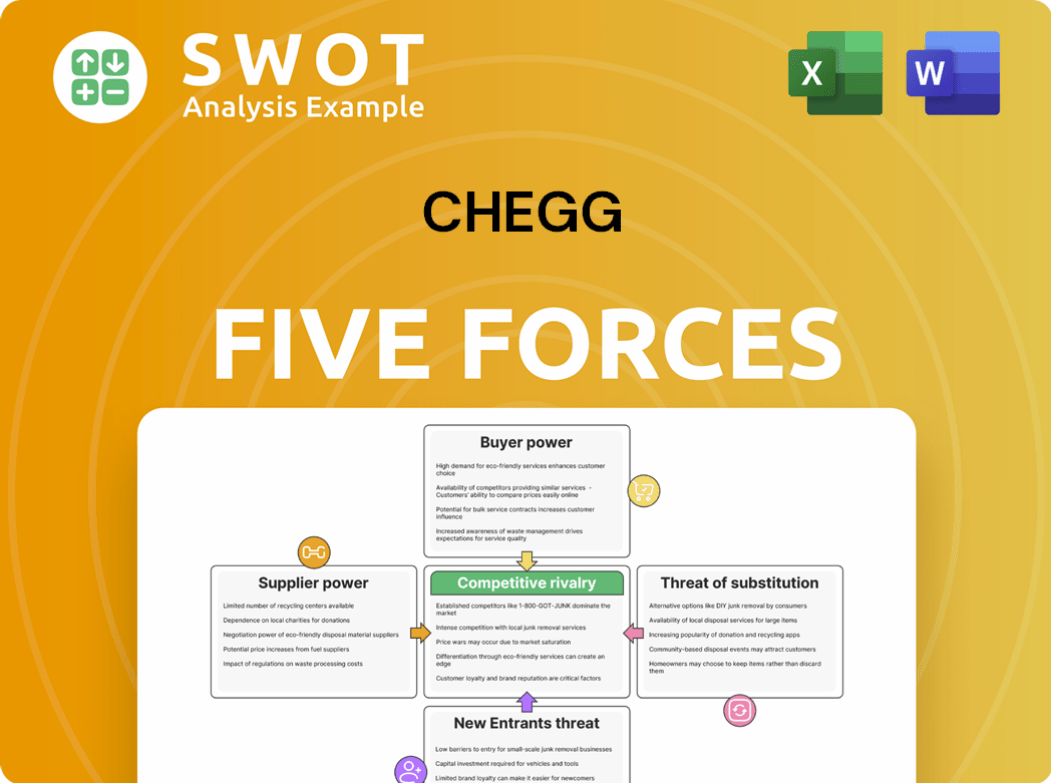
Related Blogs
- What are Mission Vision & Core Values of Chegg Company?
- What is Competitive Landscape of Chegg Company?
- What is Growth Strategy and Future Prospects of Chegg Company?
- What is Sales and Marketing Strategy of Chegg Company?
- What is Brief History of Chegg Company?
- Who Owns Chegg Company?
- What is Customer Demographics and Target Market of Chegg Company?
Disclaimer
All information, articles, and product details provided on this website are for general informational and educational purposes only. We do not claim any ownership over, nor do we intend to infringe upon, any trademarks, copyrights, logos, brand names, or other intellectual property mentioned or depicted on this site. Such intellectual property remains the property of its respective owners, and any references here are made solely for identification or informational purposes, without implying any affiliation, endorsement, or partnership.
We make no representations or warranties, express or implied, regarding the accuracy, completeness, or suitability of any content or products presented. Nothing on this website should be construed as legal, tax, investment, financial, medical, or other professional advice. In addition, no part of this site—including articles or product references—constitutes a solicitation, recommendation, endorsement, advertisement, or offer to buy or sell any securities, franchises, or other financial instruments, particularly in jurisdictions where such activity would be unlawful.
All content is of a general nature and may not address the specific circumstances of any individual or entity. It is not a substitute for professional advice or services. Any actions you take based on the information provided here are strictly at your own risk. You accept full responsibility for any decisions or outcomes arising from your use of this website and agree to release us from any liability in connection with your use of, or reliance upon, the content or products found herein.